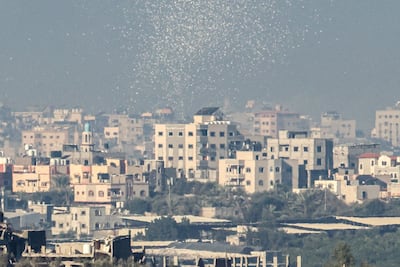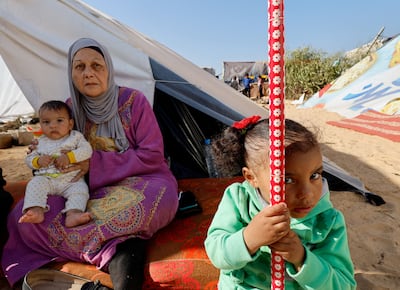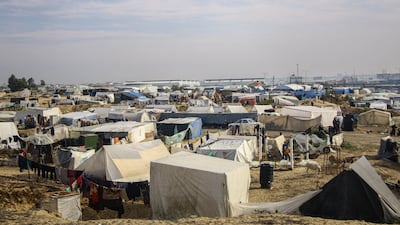Live updates: Follow the latest news on Israel-Gaza
Palestinians in Gaza are erecting thousands of tents in Mawasi near the city of Rafah on the border with Egypt, opposing plans to move them to the Sinai Peninsula.
Egyptian President Abdel Fattah El Sisi and others have been critical of a perceived plan by Israel to force Gazans to resettle in the peninsula.
The displaced Gazans, many of whom have fled homes or temporary shelters more than once since the war began on October 7, say there are no safe places left in the enclave. Israeli forces continue to push them from one place to another by bombing or dropping leaflets telling them to leave.
Mawasi is where many have settled for the time being, living in tents made of scraps of fabric and other materials, with basic amenities like running water and electricity nowhere to be found.

Nidal Al Fayomi, originally from Gaza city, fled with his family to Khan Younis in the south thinking it would be safer there.
“After reaching Khan Younis, we found that it was too dangerous. We moved to Rafah because we couldn't find anywhere else to go,” he told The National from Mawasi.
He said he feels “exhausted”.
“I am not going to leave my land. I will not leave to Sinai,” he said.
Salwa Al Sheikh has suffered a similar ordeal. She left Al Shatee refugee camp in Gaza city after Israeli troops forced her out.
“We have left everything behind. We don't even have the most essential things. But we moved from Gaza to Khan Younis and to Rafah. We will not go to Sinai.”
Right now, she will settle for the basics.
“All that we need is a bathroom to use,” she said. “We don’t eat because we are afraid to need to use the bathroom.”
Like many others, Ms Al Sheikh feels helpless.

“No one is looking out for us. We are neglected.”
Shahrazad Dallool meanwhile, feels angry.
“I have not taken a bath in one month,” she said, explaining how the lack of hygiene is taking its toll. “My whole body is dirty. I have skin irritation.”
She added that she feels “paralysed”.
Her son was injured in a massive October 17 explosion at Al Ahli Hospital.
“My son needs special care,” she explained. “I only want him to drink milk to help him to heal his injuries.”
But despite the shortage of aid and her son's need for care, Ms Dallool has also refused to flee to Sinai.
Massive toll of wounded
The death toll in Gaza has risen past 18,200 and the number of injured has reached nearly 50,000.
The Gaza Ministry of Health has said “hundreds” have died waiting for treatment.
On Monday, UN aid chief Martin Griffiths said diplomatic efforts are becoming even “more important” as the war intensifies.
“The situation is bad and getting worse” in the Palestinian enclave, he said at the Doha Forum.
Qatar said it is continuing efforts to help arrange another prisoner exchange between Hamas and Israel despite what is seen as a lack of willingness on both sides to strike a new deal.
“The very fact of the destruction and the intensification of the military operation that we have been hearing about in the south of Gaza, and the threats to neighbouring countries, only makes the prospects and the priorities and the importance … of your efforts all the more important,” Mr Griffiths said.
On Friday, the US vetoed a UN resolution calling for a ceasefire in Gaza – a move that Iran's Foreign Minister described as “shameless”.
“It has been a political fiasco for the White House, which very clearly and shamelessly vetoed the ceasefire,” Hossein Amirabdollahian said at the Doha Forum.
The Iranian official said Hamas's political leader Ismail Haniyeh had told him his group is prepared to fight Israel for “years”.


